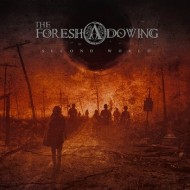 The Foreshadowing’s 2007 album ‘Days of Nothing’ was a surprisingly good debut; poppy and polished yet saved from being a cheese-fest by its rich, brooding vocals and gloomy, wounded riffs. It had a certain sincerity about it that earned the band quite a lot of goodwill from me, something that has survived through follow-up ‘Oionos’, even if that one wasn’t quite so impressive and came with a band photo that looked like a particularly angsty GAP advert. Hell, I can even overlook that bloody Sting cover.
The Foreshadowing’s 2007 album ‘Days of Nothing’ was a surprisingly good debut; poppy and polished yet saved from being a cheese-fest by its rich, brooding vocals and gloomy, wounded riffs. It had a certain sincerity about it that earned the band quite a lot of goodwill from me, something that has survived through follow-up ‘Oionos’, even if that one wasn’t quite so impressive and came with a band photo that looked like a particularly angsty GAP advert. Hell, I can even overlook that bloody Sting cover.
‘Second World’ is still slick gothic doom, and seems quite bland at first but slowly reveals itself as an accomplished exercise in subtlety and restraint. The album has an apocalyptic theme, opening with the sounds of a crackling fire and somebody loading a gun. Elsewhere air-raid sirens and tolling bells drift in and out of hearing. It’s an album that’s full of loss, but also stoic and determined. Front man Marco Benevento’s morose croons still dominate the songs, sitting atop a crystalline production and guitars that sound like an arresting mix of mid-period Katatonia and Paradise Lost, whilst the drums tend towards martial swells, building the songs up urgently before dissipating away.
At the heart of the album is the excellent way in which it mixes light with heavy; urgency with unhurriedness. A sedated, delirious feel permeates the album, akin to being locked inside some mental cocoon whilst the world outside disintegrates. Opener ‘Havoc’ is driven forward by an urgent bassline, tempered by delicate keys and soothing choral chants, whilst ‘The Forsaken Son’ goes from a bombastic mid-paced chug to sorrowful clean croons before a rousing, almost Celtic riff rises from the ashes. ‘Aftermaths’ weighs hopeful, clean passages against weighty and up-tempo gothic doom riffs, whereas the title track is more gentle and bittersweet, with lamenting melodies unraveling around a fragile, dreamily melancholy chorus.
The momentum slowly drains as the album progresses, with both ‘Reverie is a Tyrant’ and ‘Colonies’ made of gentle meanderings and dynamic drum-led build-ups, reflective fragments of acoustic guitar popping up here and there, whilst ‘Noli Timere’ starts slow and despondent and gradually unwinds until it borders on funeral doom territory, hinting at Skepticism’s leaden, mediaeval take on the genre with its thick swathes of church organ, embellished here with incense-heavy Latin chanting. Closer ‘Friends of Pain’ meanwhile is nothing but rich, Ulver-esque synth and intonation, sung so slowly as to be almost spoken word.
Though it doesn’t immediately make a strong impression, ‘Second World’ reveals itself through repeated listens to be a thoughtful, well-crafted album that’s a lot more mature than the band’s previous efforts. It can seem overly mawkish and saccharine initially, but these concerns quickly melt away in the face of its smoldering, emotive arrangements and disarming air of sincerity. It’s gentle and reflective, but not lacking in backbone or kick, and there’s no filler or dud tracks to be found. Its theme and tone rather hit a nerve too, as the outside world faces a new age of austerity and uncertainty. Definitely worth a look.
(8/10, Erich Zann)

Leave a Reply